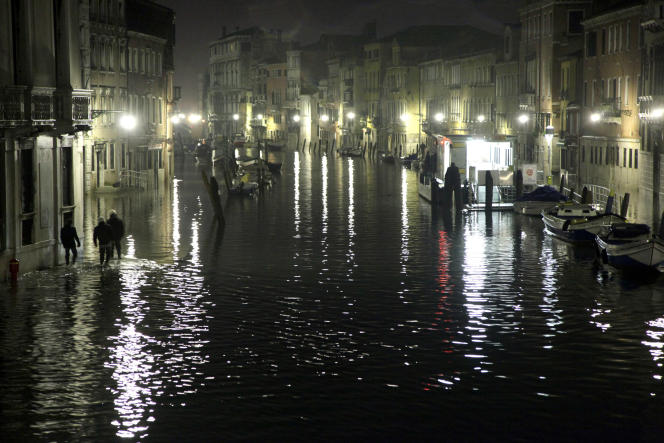Civilizations are mortal and, while the painters of the Quattrocento explored this historical truth through the ruins of ancient Rome (temples, tombs, baths, palaces, ramparts, bridges), the architects made plans to prevent any destruction. So it was with Venice, a mineral marvel suspended on millions of stakes in silt and mud; Venice, jewel of the Renaissance, destined to be reborn until the day of its disappearance.
Isabelle Autissier’s new novel imagines this peril prophesied a thousand times: the death of the Serenissima. Its collapse. Its engulfment by the waters. The Shipwreck of Venice opens, in fact, with the dreaded catastrophe: the city of the Doges reduced to rubble, under the combined effect of a powerful storm and an exceptional high tide (acqua alta). . So many vestiges of a fallen splendor, of a human ambition as fragile as it is arrogant. And the MOSE system (set of retractable bars to protect the lagoon from the excesses of the Adriatic), which entered service in October 2020, may have even made matters worse.
The past, the present and the future
Combining history and current events (the Covid-19 pandemic, fish and dolphins back in the lagoon), Isabelle Autissier traces the disaster and its genealogy, peppered with scandals. “We sinned by pride in thinking we could master everything. Centuries ago, with little knowledge, it could be excusable, but today it’s foolish,” says one of the characters in the novel, counting the errors and the causes: the pumping of the groundwater for industrial purposes in the 1950s, the drying up of the soil to build port and airport areas, the digging of deep channels, the rise in sea level due to global warming. Not to mention the 30 million annual tourists carried by planes or ocean liners, these stripping the foundations of Venetian buildings.
The past, present and future of Venice are embodied here by three protagonists: Maria Alba, descendant of a penniless aristocratic line, whose ancestors appear in museums; Guido, her husband, son of a peasant from Veneto, who made his fortune in real estate and was, before the tragedy, councilor for economic affairs in the city; finally, their rebellious daughter, art student, activist committed to the defense of the environment.
Whatever the latitudes of her novels (Patagonia, the Russian Far North, South Georgia), Isabelle Autissier manages, each time, to outline a climate as much as a state of mind. She slips through the streets or the paths avoiding the literary clichés, innumerable as far as Venice is concerned. Isabelle Autissier, now president of WWF France, has sailed around the world four times alone. At the helm, nose to the wind, she made up lots of stories and chatted with the seagulls. His first boat, built in 1987, was called Parole. It was a good omen. Mastery of navigation between past and present, romantic breath beyond discreet erudition, heading for environmental urgency… Isabelle Autissier offers, with Le Naufrage de Venise, another form of crossing: that of the beating heart of a cited on probation.
Read an excerpt on the Stock editions website.

















